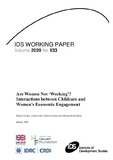| dc.contributor.author | Chopra, Deepta | |
| dc.contributor.author | Saha, Amrita | |
| dc.contributor.author | Nazneen, Sohela | |
| dc.contributor.author | Krishnan, Meenakshi | |
| dc.date.accessioned | 2020-01-10T11:36:44Z | |
| dc.date.available | 2020-01-10T11:36:44Z | |
| dc.date.issued | 2020-01-10 | |
| dc.identifier.citation | Chopra, D.; Saha, A.; Nazneen, S. and Krishnan, M. (2020) Are Women Not ‘Working’? Interactions between Childcare and Women’s Economic Engagement, IDS Working Paper 533, Brighton: IDS | en |
| dc.identifier.isbn | 978-1-78118-605-3 | |
| dc.identifier.issn | 2040-0209 | |
| dc.identifier.uri | https://opendocs.ids.ac.uk/opendocs/handle/20.500.12413/14976 | |
| dc.description.abstract | This paper seeks to examine how childcare impacts upon women’s economic engagement in India, Nepal, Tanzania, and Rwanda. In delineating the linkages between childcare, paid work, and other tasks that women carry out within and outside the house, this paper privileges women’s own perceptions of childcare as ‘work’, and the extent to which they see this as a tension between women’s caregiving role and their income-generating role. Our findings corroborate that women experience significant trade-offs as they engage in both market activities and childcare tasks. We highlight the important distinction between direct and supervisory childcare – with supervisory childcare taking up a large amount of women’s time across all contexts. In bringing women’s voices to the fore of the prevalent discourse of
childcare being a ‘barrier’ to women’s paid work, this paper highlights the complex and bidirectional
relationship between childcare and women’s economic engagement. Our analysis shows that for women from lower-income households, the effect of childcare on women’s engagement in paid work (hours, location, type, or nature of work) is mediated by different factors: (a) the economic condition of the household; (b) the availability of alternative care arrangements; (c) the household structure and; (d) alternative options (for both men and women) for paid work. This research highlights how complex and constrained women’s choices are, in a context of low-paid jobs and lack of support for childcare from
other institutional actors, and how women posit childcare as a positive and desirable experience. | en |
| dc.description.sponsorship | UKAID | en |
| dc.description.sponsorship | International Development Research Centre | en |
| dc.description.sponsorship | Hewlett Foundation | en |
| dc.language.iso | en | en |
| dc.publisher | IDS | en |
| dc.relation.ispartofseries | IDS Working Paper;533 | |
| dc.rights.uri | http://creativecommons.org/licenses/by-nc/4.0/ | en |
| dc.subject | Gender | en |
| dc.title | Are Women Not ‘Working’? Interactions between Childcare and Women’s Economic Engagement | en |
| dc.type | IDS Working Paper | en |
| dc.rights.holder | IDS | en |
| rioxxterms.funder | Default funder | en |
| rioxxterms.identifier.project | Default project | en |
| rioxxterms.version | VoR | en |
| rioxxterms.funder.project | 9ce4e4dc-26e9-4d78-96e9-15e4dcac0642 | en |


